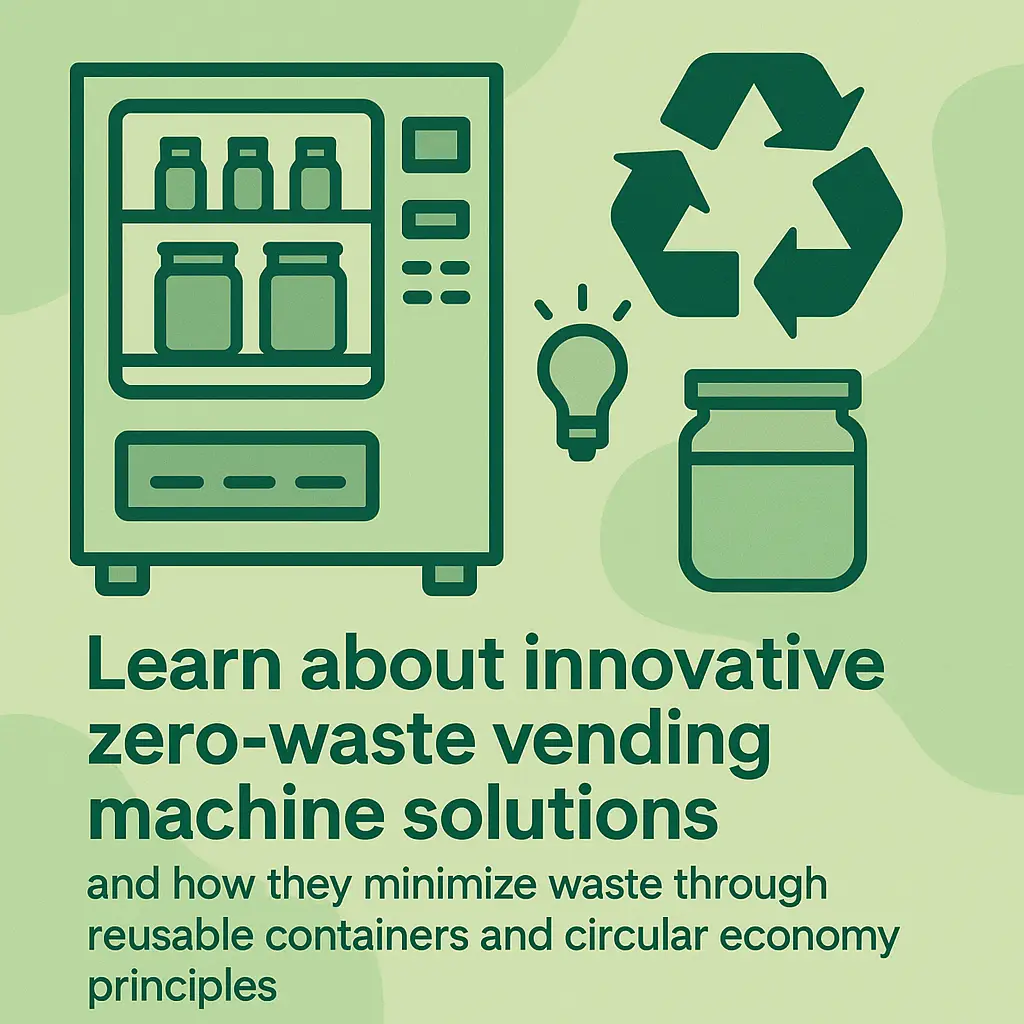Zero-Waste Vending Solutions
Learn about innovative zero-waste vending machine solutions and how they minimize waste through reusable containers and circular economy principles. Reduce landfill contribution.
Back to Eco Friendly Vending ResourcesLearn about innovative zero-waste vending machine solutions and how they minimize waste through reusable containers and circular economy principles. Reduce landfill contribution.
Back to Eco Friendly Vending ResourcesZero-waste vending solutions offer an innovative approach to reducing environmental impact by providing products in reusable containers or through refillable systems. This aligns with circular economy principles, moving away from single-use packaging.
![]() Significantly reduce plastic and packaging waste
Significantly reduce plastic and packaging waste
![]() Boost your organization's green credentials and appeal
Boost your organization's green credentials and appeal
![]() Offer convenient, eco-friendly options for employees and customers
Offer convenient, eco-friendly options for employees and customers

The push for sustainability is transforming industries across the board, and vending is no exception. Zero-waste vending solutions are at the forefront of this movement, offering businesses and institutions a tangible way to reduce their ecological footprint. These innovative systems go beyond mere recycling; they redefine how products are packaged and consumed, moving towards a truly circular model. By focusing on reusable containers and refillable options, zero-waste vending machines significantly cut down on single-use plastics and packaging waste.
At its heart, zero-waste vending is about minimizing waste at every stage of consumption. This often involves mechanisms where consumers either bring their own containers to be refilled, or the vending machine dispenses products into durable, returnable packaging. This approach profoundly impacts waste reduction, aligns with broader corporate sustainability goals, and educates consumers on eco-conscious choices. Many zero-waste vending models also incorporate energy-efficient designs, like those explored in our article on Energy Star Certified Vending Machines, further amplifying their environmental benefits.
For operations looking to make a significant environmental statement, embracing zero-waste vending is a powerful step. Imagine an office building where employees can refill their coffee cups directly from a vending machine, or a university campus where students grab snacks in reusable pouches that are returned and sanitized. This not only dramatically shrinks landfill contributions but also creates a positive, forward-thinking image for the organization. Such initiatives are gaining traction in various sectors, including those discussed in our overview of Eco-Friendly Vending in Offices, as businesses seek to demonstrate genuine commitment to the planet.
Zero-waste vending extends its impact beyond just plastic reduction. These solutions are often paired with other green initiatives, such as sourcing products from local, ethical suppliers, or offering organic and fair-trade options. The goal is a holistic environmental strategy that considers the entire lifecycle of a product, from production to consumption and back. This comprehensive approach is detailed in various discussions on Sustainability Across Vending Machine Life Cycle, highlighting the importance of integrated thinking in fostering true ecological responsibility. By investing in these future-forward vending solutions, businesses contribute to a healthier planet while meeting the growing demand for sustainable practices from their customers and employees.
Zero-waste vending solutions integrate vending machines into a circular economy model, primarily by offering products in reusable containers or packaging designed for minimal environmental impact.
They reduce waste by eliminating single-use packaging, encouraging the use of bring-your-own containers, or providing products in refillable or returnable systems.
Common products include beverages, snacks, bulk dry goods, fresh produce, and even personal care items, all dispensed with a focus on reusability and minimal packaging.
Many zero-waste vending machines are designed with energy-efficient components, such as LED lighting and advanced cooling systems, further reducing their environmental footprint.
Customers typically bring their own reusable containers, which are filled by the machine. Some systems also offer internal return mechanisms for reusable packaging provided by the vendor.
Benefits include reduced landfill waste, lower carbon emissions, positive brand image, and potential cost savings on packaging for businesses.
They are ideal for offices, universities, corporate campuses, airports, retail spaces, and any location seeking to enhance its sustainability efforts.
Initial investment may be higher, but long-term savings on waste management and increased customer appeal often offset these costs, particularly for eco-conscious consumers.
Most systems are designed with strict hygiene protocols, often requiring customers to use clean, personal containers or providing sanitized reusable vessels for purchase and return.
By emphasizing reuse, repair, and recycling, they keep resources in circulation for longer, minimizing resource extraction and waste generation throughout the product lifecycle.